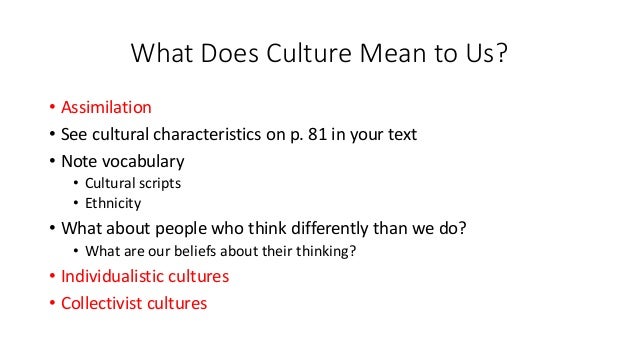

Cultural differences can also exist in beliefs about if, when, and how to resolve traumatic stress symptoms, and about help-seeking and utilization of supportive resources outside their community.The way a child or family interprets the meaning of the trauma will influence subsequent distress, reactions, and ways of coping.For example, some cultures interpret illness and other trauma events as punishment, a test or rite of passage, or a special message.Viewed through a cultural lens, a child's or family's subjective perceptions of the trauma experience can sometimes be quite different from a provider's. Cultural differences can exist in the perception and interpretation of the trauma event, the meaning given to the traumatic event and beliefs about control over the event.Research suggests that it is NOT the objective severity of the trauma, but how it is experienced by the child or parent that determines traumatic stress responses. Understanding perceptions of traumatic stress and the role of beliefs: Implementing Culturally-Sensitive Trauma- Informed Care with patients.Considerations in providing Culturally-Sensitive Trauma-Informed Care.How do I implement Culturally-Sensitive Trauma Informed Care? Working within and through the family structure to promote emotional and social support, and utilization of coping resources.Attending to the distress of the child or family, in the way that they define it.Helping to restore a sense of safety for the child and family through trust-building.Understanding the role of beliefs in the interpretation of trauma and the recovery process.Recognizing cultural variations in the subjective perception of trauma and traumatic stress responses.What are the key components of Culturally-Sensitive Trauma-Informed Care?Ī culturally-sensitive, trauma-informed care provider can help traumatized children and families by:

Ethnocultural factors play an important role in an individual's vulnerability to, and experience and expression of traumatic stress, as well as one's response to trauma treatment. Research suggests that although there is a universal biological response to trauma, cultural factors can influence the biopsychosocial experience of trauma and subsequent traumatic stress reactions. What's unique is that attention must also be paid to cultural variations in the child's and family's experience of and response to trauma. How does this complement culturally competent health care practice?Īs in all pediatric care, Culturally-Sensitive Trauma-Informed Care requires attention to be paid to a child's and family's values and beliefs about health and illness. Here, "culture" extends beyond the identification of a child and family's race and ethnicity to include other variables such as faith/religion, sexual orientation, region of residence, and level of acculturation, and closely related factors such as socioeconomic status and literacy level. Culturally-Sensitive Trauma-Informed Care refers to the capacity for health care professionals to effectually provide trauma-informed assessment and intervention that acknowledges, respects, and integrates patients' and families' cultural values, beliefs, and practices.


 0 kommentar(er)
0 kommentar(er)
